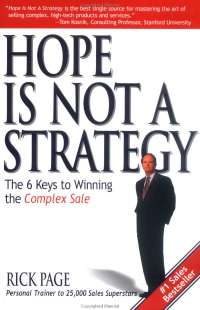 Author: Rick Page
Author: Rick Page
Started: 26 Dec 2005
Finished: 11 Jan 2006
178p / 17d
10 p/d
Soon after my ex-employer (who I will not name) first told me that they wanted me to start playing an increasingly sales oriented role, my boss gave me this to read. I put it on the pile to read, but did not rush to it. They kept saying how important this book was in terms of the approaches it advocated and such. I just kept thinking that if they were so hot on a book called “Hope is Not a Strategy” why did they run the company in a way that seemed like hope was the ONLY strategy. Everything seemed predicated on making wild promises to get business and then crossing your fingers and hoping that somehow all the pieces would come together in time if everyone just pushed hard enough.
But anyway, a little after I had given my notice and I was done with them, I actually got to the book. And it really does have a lot to say that do make sense when doing sales into a complex sales process. Now, I tend to be uncomfortable with sales in general. I’m much more comfortable with a retail model than a model that actually requires sales people. But if you are in a mold that requires that, and where the people doing the buying have a complex process and things are decided in the ways that often go with that, OK, this has some strategies. Do I have any idea if they are optimal or not? No idea. And thank goodness I’m not being asked to think about that sort of thing any more, so I really just don’t have to care.
Not much else to say about this book except this:
After reading it I note that my ex-employers while taking lessons from many chapters of the book, have apperantly been practicing selective reading. There are a few important passages in the book that they seem to have neglected:
Page 14: “The ethical premise of competitive selling is first, your solution is genuinely good for the client’s organization, and second, your tactics remain morally, legally, and ethically sound. If the former is not true, you should get out of the account. If the latter is not true, you should get out of the business.”
Page 15: “A short-term oriented, predatory sales force can actually be a long-term sales prevention force. Unless you exceed expectations of most clients and delight a few, you will not build a foundation of customer loyalty.”
Page 154: “Every satisfied client is a neutron that can bang into another marketing molecule releasing enormous energy and enthusiasm for you and your company. Of course, if your clients are unhappy with the results of what they bought, then the nuclear metaphor becomes one of toxic pollution and fallout as one bad reference cancels out half a dozen good ones.”
Page 167: “Failure to exceed expectations will mean that in the long run, you are actually performing a sales prevention activity and inoculating the account from further business with you.”
But then again, I really didn’t need a book to tell me any of that.
